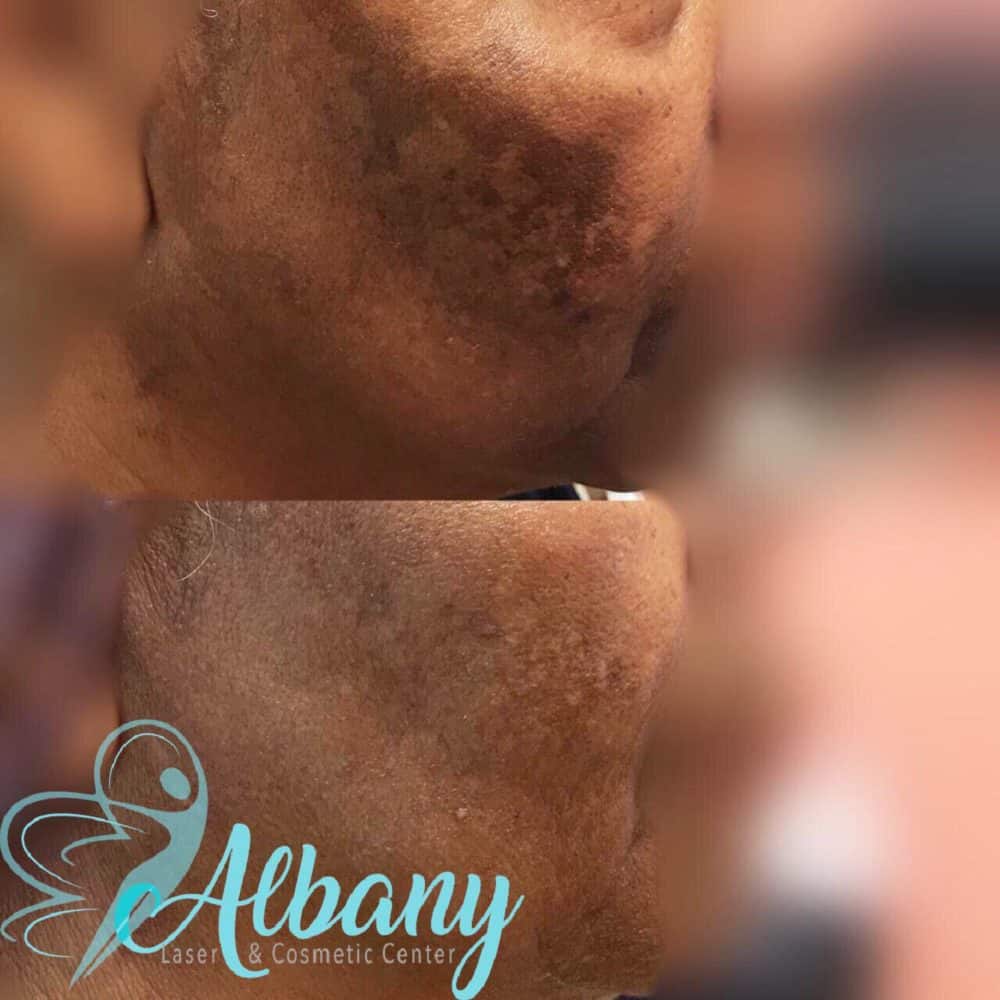What are Melasma and hyperpigmentation?
In short, they are symptoms of extra active melanocytes at different parts of the skin at different depths. We will not go more in-depth on what induces the irregular behavior of the melanocytes and the abundant production of melanin.
What is the Fraxel Laser, and how does it work?
The Fraxel laser operates by inflicting many small lesions deep inside the skin. Those injuries ‘signal’ your skin to need more collagen in certain areas to mend and cure the problem. Reaching old skin cells with new ones enhances skin texture, tone, and pigmentation.
Fractional technology is divided into two categories:
- Ablative: A more severe therapy that involves the removal of skin cells and stimulating collagen production deep inside the skin. The downtime of this laser is longer.
- Non-ablative: This procedure heats the tissue under the skin without removing the top layer of the skin. This laser efficiently blends melasma with healthy-looking skin.
Patients must prepare themselves in advance for the Fraxel laser to perform at its best:
- Makeup should not be worn.
- Use no peels, active acids, or retinoid-containing products for a week before the procedure.
- You will be topically numbed with cream for around 45 minutes before the procedure.
- After that, depending on the size of the target region, the treatment should take no more than 20 minutes. Your therapy may be postponed if you have a lot of acne outbreaks or sores.
Potential Fraxel Laser Treatment Side Effects
When using a Fraxel laser to treat your skin, certain side effects are expected. However, a few studies have shown that utilizing a Fraxel laser does not cause significant negative effects. Only 7.6% of 961 patients treated with the Fraxel laser experienced a response to the therapy, with acneiform eruptions and herpes outbreaks being the most prevalent. You may notice redness, swelling, itching, and peeling right after the therapy. Your skin may take up to 7 days to return to normal (Irwin).
For a speedier recovery, proper aftercare is critical:
- It’s tempting to peel the skin yourself, but you’ll be prolonging your recovery period.
- During this time, avoid using any acids or cosmetics containing strong chemicals.
- Don’t overexpose yourself to the sun, and use sunscreen.
Is Using Fraxel Lasers For Melasma Safe?
Fraxel lasers are generally safe to use, but they aren’t for everyone, especially those with darker skin. Using a Fraxel laser to treat melasma may produce inflammation, which might aggravate the problem. Whether you want to know if Fraxel lasers are good for you, you should talk to your dermatologist. You should also look for a board-certified dermatologist with a strong track record who can help you through the full healing process.
Case 1015
An African American female, 51 years old, has melasma patches over her cheeks. The patches are over 20 years old and worsen after a recent chemical peel.
Treatment
Before starting the Fraxel treatment, Dr. Kamal Alhallak put the patient on low concentration bleaching cream for two weeks. Treated the area with eight passes of the Fraxel thulium laser 1927 nm wavelength, 20 J/cm2, and 40% coverage. The patient received two Fraxel Laser treatments.
Results
Cost
The full protocol cost for the cheek area cost $1500.
Downtime
Seventy-two hours of redness, no direct sun exposure for three days.
Upper Eyelid tightening with laser Case # 1013
Jowl sulcus Case # 1009
Coolsculpting Results: Case No. 1006
Enlarged Pores Treatment: Case No.1004
